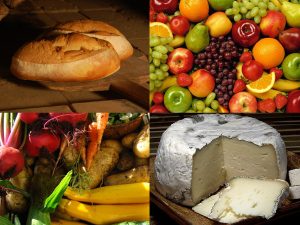A group of local people in Stroud are trying to set up a land commons, purchasing land using the ‘use-credit obligations‘ model and renting it to local food producers. The biggest problem is that small, local food producers are having a hard time making ends meet, because small farm incomes are falling, due to supermarkets constantly squeezing farmers/growers, to make food prices cheaper and cheaper. But at the same time, their costs (including housing costs) are continuously rising. This means that small producers find it hard to make a living, so that they can pay rent on land.
So Stroud Land Commons are partnering with the Open Food Network (OFN) to try to create more markets for local food producers. OFN provide an online shopfront for small, local food producers all over the UK (and the world).
Below is an outline of the sort of things that are happening in the background, to make the land commons and local food production more viable.

Over to Nick of Stroud Land Commons and the OFN for more details:
Background
Small-scale farmers, growers and food and drink producers have traditionally been excluded from selling to schools, hospitals and other public sector procurement contracts – partly because they cannot supply the consistently high quantities of produce needed by these buyers.
Public sector food buyers are increasingly interested in sourcing from local producers. This is partly due to an interest in making their food supply systems more resilient to the shocks caused by pandemics, climate crises and political unrest. There is also growing acknowledgement of the nutritional benefits of sourcing locally-produced, freshly harvested produce.
The Open Food Network (OFN) carried out this 2023 pilot work in Wales which successfully brought together multiple small-scale producers in a single online ‘hub’. The hub took on contracts with procurement buyers locally then consolidated the varying levels of produce available. This consolidated list was then used by buyers to place regular orders with the hub. The hub then sourced the produce from their local growers, farmers and producers and delivered the produce to the buyers.
This pilot work has now been followed up by this UKRI-funded project which will run until 2028. We are proposing that Gloucestershire County Council (GCC) could run a parallel procurement pilot using the Stroudco Food Hub which was established in 2012. Stroudco is primarily a B2C (i.e. selling to the public) hub and has paused trading due to the cost of living crisis. However, the hub is ready to re-start at any time and the software behind the hub is in constant use by over 120 hubs across the UK, including the four procurement hubs in the UKRI project.
Our partner in this proposal is Stroud Land Commons which is providing support services to several local community land and food growing projects.
Local organisation The Great Plate is currently serving 8 schools from 5 kitchens. Another 5 schools are likely to join the Great Plate contract. We’re proposing that these 13 schools might be considered for a pilot project. If the pilot is successful this procurement process could be scaled up to cover more schools and other public buyers.

Some of the benefits of this project include:
- improving the levels of nutrition in school meals;
- benefits to the county’s environment by supporting the expansion of agroecological growers;
- making Gloucestershire food systems more resilient to shocks caused by pandemics and global political instability.
We think this work will provide more (and more reliable) outlets for the sale of locally-produced food, which will increase income for small food producers and commons tenants, making the Stroud Land Commons project more viable.














